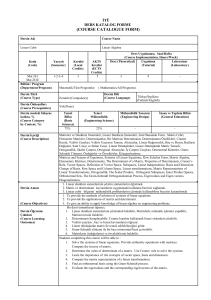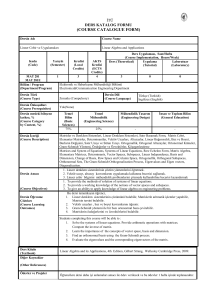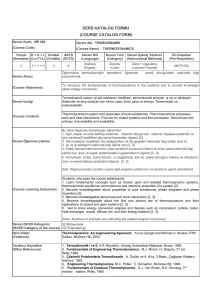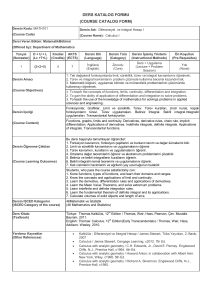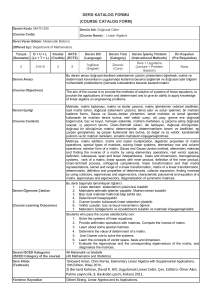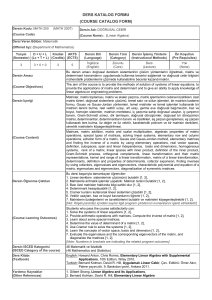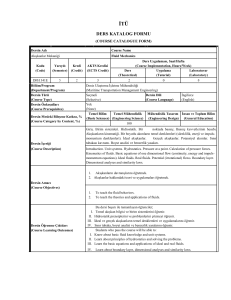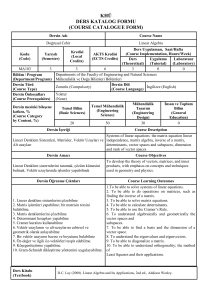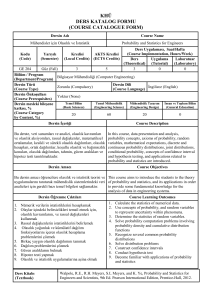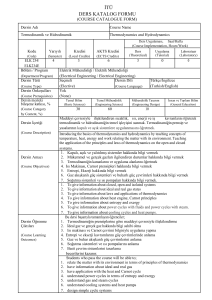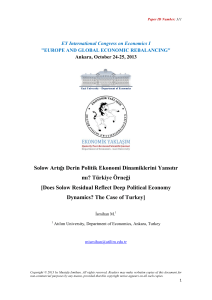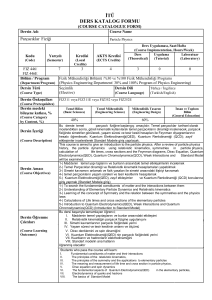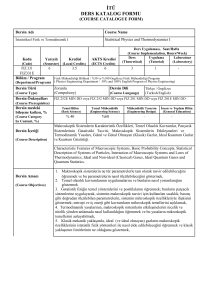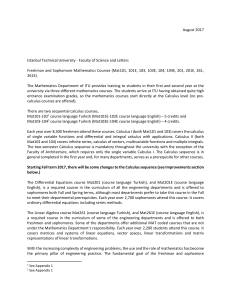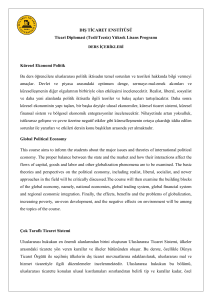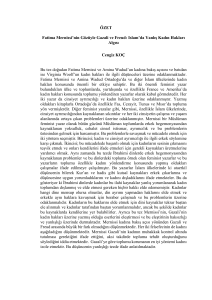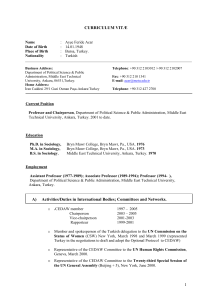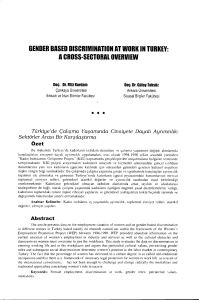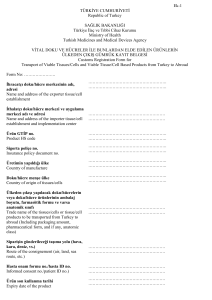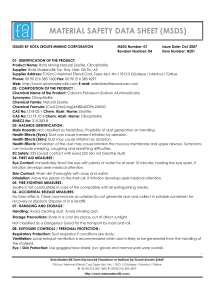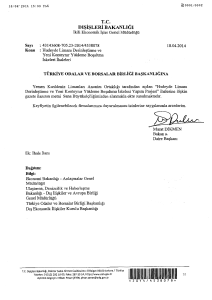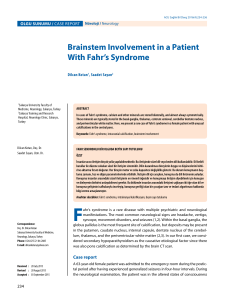kadın ve siyaset eğitim müfredatı
advertisement
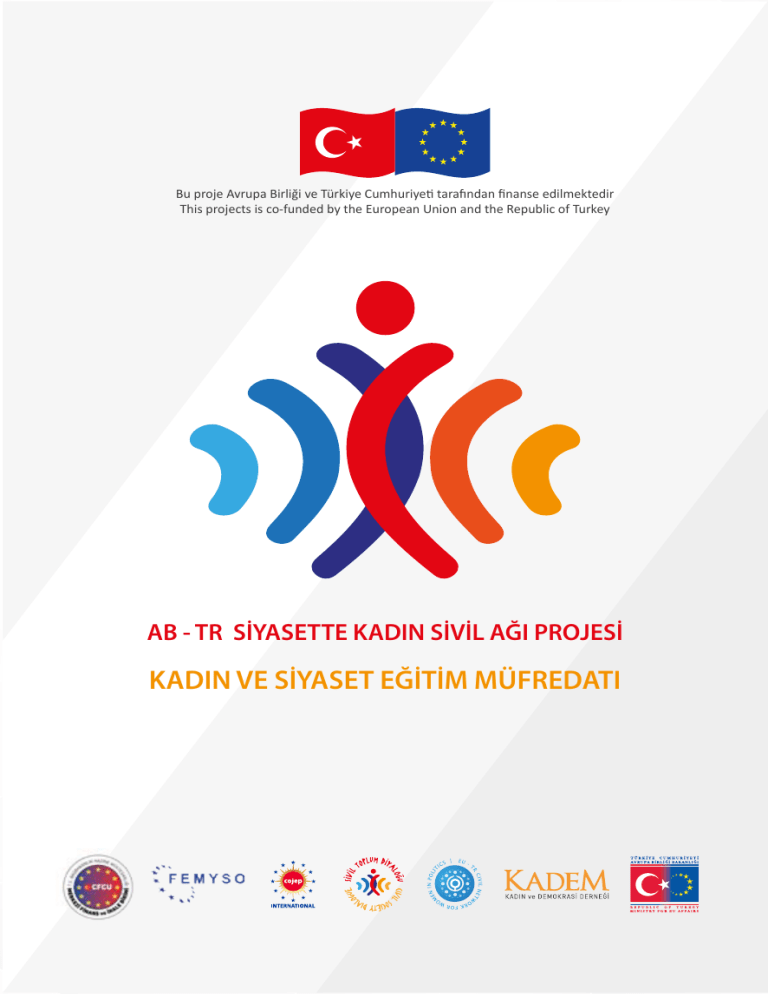
Bu proje Avrupa Birliği ve Türkiye Cumhuriyeti tarafından finanse edilmektedir This projects is co-funded by the European Union and the Republic of Turkey AB - TR SİYASETTE KADIN SİVİL AĞI PROJESİ KADIN VE SİYASET EĞİTİM MÜFREDATI NETWORK FOR WOMEN AB-TR SİYASETTE KADIN SİVİL AĞI EĞİTİM MÜFREDATI Bu eğitim ile amaçlanan, katılımcıları siyasal süreç ve olguların toplumsal temelleri ile tanıştırarak birey, sivil toplum ve devlet arasındaki etkileşimin niteliği, türleri ve sonuçları konusunda toplumsal cinsiyet temelli bir bakış açısı oluşturabilmektir. Diğer modern ülkelerde olduğu gibi Türkiye’de de temsili demokrasiden katılımcı demokrasiye doğru bir değişim söz konusudur. Bu değişim içinde modern siyasal sistemlerin bireylerin değişen ve artan istemlerini karşılayabilmesi için aktif bir siyasal katılım önem arz etmektedir. Türkiye açısından düşünüldüğünde toplumsal cinsiyet ilişkilerinin belirleyici şekilde etkilediği siyasal katılımın artırılması için eğitim sürecinde özellikle toplumsal cinsiyet ilişkileri üzerinde katılımcıların siyasal motivasyonları artırılmaya çalışılacaktır. NETWORK FOR WOMEN EĞİTİM MODÜLLERİ VE İÇERİK 1. MODÜL : TOPLUMSAL CİNSİYET VE SİYASET Amaç Kadınların siyasete katılımının önemini ortaya koymak İçerik 1. Hafta: Giriş ve Kavramsal Çerçeve 2. Hafta: Günlük Hayatta Toplumsal Cinsiyet 3. Hafta: Toplumsal Cinsiyet ve Devlet 4. Hafta: Kültür ve Toplumsal Cinsiyet İlişkisi 5. Hafta: İslam ve Kadın 6. Hafta: Toplumsal Cinsiyet ve Ekonomi 7. Hafta: Toplumsal Cinsiyetin Siyasal Katılım Üzerindeki Etkisi 8. Hafta: Toplumsal Cinsiyet ve Küreselleşme Kaynaklar ◊ Ş. Tekeli, Kadınlar, Siyasal Toplumsal Hayat, İletişim, 1982,; ◊ J. Donovan, Feminist Teori, İletişim, 2015; ◊ Z. Ali, H. Hırata, Eleştirel Femizm Sözlüğü, Dipnot, - 2015, İslami Feminizmler, İletişim, 2014. Yardımcı Kaynaklar ◊ Meyer, Mary K., and Elisabeth Prugl, Gender Politics in Global Governance, Rowman and Littlefield, 1999. ◊ Lorber, Judith, Paradoxes of Gender, Yale University Press, 1994. ◊ Rubery, Jill, Mark Smith and Colette Fagan, Women’s Employment in Europe: Trends and Prospects, Routledge, 1999. NETWORK FOR WOMEN DERS İÇERİKLERİ 1. Hafta: Giriş ve Kavramsal Çerçeve: Bu dersin temel amacı siyasette kadın katılımına ilişkin genel kavramların katılımcılar tarafından anlaşılmasının sağlanmasıdır. Bu çerçevede katılımcılara cinsiyet, toplumsal cinsiyet, paternalizm ve maternalizm ayrımı gibi kavramlar hakkında bilgilendirme yapılacaktır. Ders sonunda katılımcıların ana kavramlar ve teorik çerçeve hakkında bilgi sahibi olması beklenmektedir. 2. Hafta: Günlük Hayatta Toplumsal Cinsiyet: Bu dersin temel amacı cinsiyet ve cinsiyete ilişkin kavramların gündelik hayat üzerindeki etkisinin anlaşılmasının sağlanmasıdır. Bu amaç çerçevesinde ders kapsamında katılımcılara sosyal doku, sosyal kurumlar, aile ve annelik kavramı ve toplumsal roller üzerine bilgilendirme sunulacaktır. Ders sonunda katılımcıların cinsiyetin toplumsal gerçekliği hakkında bilgi sahibi olması beklenmektedir. 3. Hafta: Toplumsal Cinsiyet ve Devlet: Bu dersin temel amacı devletin cinsiyet temelli yaklaşımlardaki rolünün ve günümüzdeki mevcut durumun anlaşılmasının sağlanmasıdır. Bu kapsamda kamu politikaları, kamu kurumlarında kadınların durumu, siyasi partilerde kadın ve devletin toplumsal cinsiyet çerçevesindeki ana yaklaşımlarının anlatılması planlanmaktadır. Ders sonunda katılımcıların kamusal alanda cinsiyet sorununa ilişkin bir perspektif elde etmesi beklenmektedir. 4. Hafta: Kültür ve Toplumsal Cinsiyet İlişkisi: Bu dersin temel amacı kültür ve cinsiyet arasındaki karşılıklı ilişkinin anlaşılmasının sağlanmasıdır. Ders kapsamında katılımcılara, toplumda cinsiyete ilişkin kalıplaşmış yargılara ve kültürel değerler ile dil ve çokkültürlülüğün toplumsal cinsiyet üzerindeki etkilerine ilişkin durum analizleri ve analiz araçları sunulacaktır. Ders sonunda katılımcıların toplumsal cinsiyet üzerinde kültürün etkisine ilişkin bilgi seviyesinin arttırılması beklenmektedir. 5. Hafta: İslam ve Kadın: Bu dersin temel amacı İslam dininde kadın tartışmaları ile ilgili tezlerin tartışılmasıdır. Bu kapsamda ders içeriğinde İslamiyet’te kadının rolü, İslamiyet’in kadına ilişkin normları, Müslüman feminizm konuları işlenecektir. Dersin sonunda katılımcıların Müslüman toplumlarda cinsiyet tartışması ile ilgili bilgi sahibi olması beklenmektedir. NETWORK FOR WOMEN 6. Hafta: Toplumsal Cinsiyet ve Ekonomi: Bu dersin temel amacı toplumsal cinsiyet ile ekonomik ilişkilerin etkileşiminin anlaşılmasıdır. Bu kapsamda toplumsal sınıflar, ekonomi politikaları, sosyal politikalar ve kadınların karşı karşıya kaldığı temel ekonomik sorunlara ilişkin kavramlar ve yaklaşımlar hakkında katılımcılar bilgilendirilecektir. Dersin sonunda katılımcıların toplumsal cinsiyet adaletine ilişkin sorunların çözümünün ekonomik boyutu hakkında bilgi sahibi olması beklenmektedir. 7. Hafta: Toplumsal Cinsiyetin Siyasal Katılım Üzerindeki Etkisi: Bu dersin temel amacı siyasete katılımda kadın ve erkek arasında mevcut bulunan büyük farklılığın nedenlerine ilişkin teorik çerçevenin ortaya konmasıdır. Ders kapsamında siyasal katılımın mevcut durumuna ilişkin sayısal veriler ve istatistikler incelenecek, siyasette kadın liderlerin başarı hikâyeleri ve eşit katılımın önündeki engeller küresel bir perspektifle katılımcılarla paylaşılacaktır. Dersin sonunda katılımcıların siyasete eşit katılıma ilişkin bilgi düzeyinin arttırılması amaçlanmaktadır. 8. Hafta: Toplumsal Cinsiyet ve Küreselleşme: Bu dersin temel amacı küreselleşme sürecinde toplumsal cinsiyet ve cinsiyet ayrımcılığına ilişkin yaşanan değişim ve gelişmelerin incelenmesidir. Ders kapsamında küreselleşme kavramı, adem-i merkeziyetçilik, küreselleşme ve getirdiği sorunlar, ulusal ve uluslararası göç gibi kavramlar ve dönüşüm süreçlerine ilişkin bilgiler verilecektir. Dersin sonunda katılımcıların siyasette ve küreselleşme sonucu ortaya çıkan yeni dünya sisteminde kadının rolünü analiz edecek araçlara sahip olmaları beklenmektedir. NETWORK FOR WOMEN 2. MODÜL - KADININ TARİHİ DÖNÜŞÜMÜ Amaç Geçmişten günümüze kadının toplumsal konumundaki değişimi incelemek İçerik 1.Hafta: Özel Alan – Kamusal Alan Tartışması 2.Hafta: Toplumsal Bir Kurum Olarak Aile ve Dönüşümü 3.Hafta: Üretim İlişkilerinde Kadının Konumu 4.Hafta: Hukukta Kadın 5.Hafta: İnsan Hakları Olarak Kadın Hakları 6.Hafta: Dünya’da ve Türkiye’de Kadın Hakları Hareketleri 7.Hafta: Genel Değerlendirme Kaynaklar ◊ H. Arendt, İnsanlık Durumu, İletişim, 2013; J. Donovan, Feminist Teori, İletişim, 2015; ◊ Z. Ali, H. Hırata, Eleştirel Femizm Sözlüğü, ◊ A. Güriz, Feminizm, Postmodernizm, Kadın, Phoenix, 2011. Yardımcı Kaynaklar ◊ Moghadam, Valentine M. , Modernizing Women: Gender and Social Change in the Middle East, Rienner, 1993. ◊ Zurayk, Huda C., and FAdia Saadeh, “Women as Mobilizers of Human Resources in Arab Countries”, in Khoury, Nabil F., and Valentine M. Moghadam, Gender and Development in the Arab World, Zed Books, 1995. ◊ Hollows, Joanne and Rachel Moseley, Feminism in Popular Culture, Berg 2007. ◊ Tickner, J. Ann, Gendering World Politics, Columbia, 2001. ◊ Mernissi, Fatima, “Muslim Women and Fundamentalism”, Middle East Report, n153, 1988, 811. ◊ Marshall, Gul Aldikacti, “Ideology, Progress and Dialogue: A Comparison of Feminist and Islamist Women’s Approaches to the Issue of Head Covering and Work in Turkey”, Gender and Society, v19 n1, 2005, 104120. NETWORK FOR WOMEN DERS İÇERİKLERİ 1. Hafta: Özel Alan – Kamusal Alan Tartışması: Bu dersin amacı, toplumsal cinsiyet eşitsizliğine ilişkin değerlendirmelerin özel alan - kamusal alan düzleminde yapılmasıdır. Ders içeriği kapsamında kamusal alan kavramı, özel alan kavramı, bu kavramlar üzerinden yapılan toplumsal cinsiyet kodlamaları hakkındaki yaklaşımlar yer almaktadır. Dersin sonunda katılımcıların toplumsal cinsiyet perspektifinde özel alan ve kamusal alan hakkında mevcut yaklaşımlar çerçevesinde bilgi sahibi olması beklenmektedir. 2. Hafta: Toplumsal Bir Kurum Olarak Aile ve Dönüşümü: Bu dersin ana amacı toplumsal yaşam içinde ailenin rolü ve bu role ilişkin toplumsal değişim sürecinin anlaşılmasının sağlanmasıdır. Ders içeriği kapsamında aile kavramı dini/dünyevi, siyasal/toplumsal ve geleneksel/modern süreçler eşliğinde ele alınacak, mevcut değişim süreçlerine ilişkin analiz ve tespitler katılımcılarla paylaşılacaktır. Dersin sonucunda toplumsal cinsiyet ile aile kavramının toplumsal roller üzerindeki etkisi hakkında katılımcıların bilgi düzeyinin arttırılması hedeflenmektedir. 3. Hafta: Üretim İlişkilerinde Kadının Konumu: Dersin amacı değişen üretim ilişkileri çerçevesinde kadının geçmişten bugüne konumuna ilişkin tarihsel bir perspektif sunmaktır. Derste üretim ilişkilerinin tarihi, ataerkil toplum, feodal sistem, sanayi devrimi, kapitalizm ve bilgi çağı kapsamında ele alınacak bu dönüşüm sürecinde toplumsal cinsiyet ve kadının konumundaki değişime ilişkin katılımcılara bilgi verilecektir. Ders sonunda katılımcıların üretim ilişkilerinin tarihi ve kadının bu süreçteki konumuna ilişkin genel çerçeve hakkında bilgi sahibi olması beklenmektedir. 4. Hafta: Hukukta Kadın: Dersin amacı toplumsal cinsiyet eşitliği ve hukuk ilişkisi ile feminist hukuk teorisi hakkında detaylı bir perspektif sunabilmektedir. Ders içeriğinde eşitlik ve ayrımcılık yasağı kavramları, hukuki eşitlik kavramı ve mahkemelerin hukuk yorumundaki cinsiyetçilik sorunu, Anayasa Mahkemesi ve Yargıtay’ın konuya ilişkin kararlarından örnekler, CEDAW, uluslararası mevzuat ve Türkiye’de konuyla ilgili mevzuat, aile hukuku alanında eşitsizlik sorunları ve ceza hukuku alanında eşitsizliğe ilişkin tartışmalar yer alacaktır. Ders sonunda katılımcıların feminist hukuk teorisinin çalışma alanında olan cinsiyet eşitliği, kadına yönelik şiddet, ayrımcılık yasağı, medeni hukukta ve ceza hukukundaki eşitsizlik sorunları hakkında bilgi edinmesi beklenmektedir. NETWORK FOR WOMEN 5. Hafta: İnsan Hakları Olarak Kadın Hakları: Bu dersin amacı insan hakları kuramının kadın hakları bakış açısından ele alınmasıdır. Ders içeriğinde insan haklarının gelişim süreci ve kadının konumu, kadın hakları uluslararası insan hakları yapısına ve mekanizmalarına dahil etme mücadelesi, Birleşmiş Milletler tarafından Kadınlara Karşı Her Türlü Ayrımcılığın Önlenmesi Sözleşmesi (CEDAW) ve İhtiyari Protokolü, toplumsal cinsiyet, kadının insan hakları, kadınlara karşı ayrımcılık, kadın erkek eşitliği, ev içi şiddet, kadınların adalete erişimi gibi kavramlar analiz edilecektir. Ders sonunda katılımcıların kadın haklarını insan hakları perspektifinden analiz becerisi geliştirilmiş olacaktır. 6. Hafta: Dünya’da ve Türkiye’de Kadın Hakları Hareketleri: Bu dersin amacı kadın hareketinin dünyada ve Türkiye’de yaşadığı dönüm noktalarının hem tarihsel hem de kavramsal açıdan ele alınmasıdır. Ders içeriğinde Batı’da Kadın Hareketleri, İslam Dünyasında Kadın Hareketleri ve Türkiye’de Kadın Hareketleri hakkında bilgi verilecek, bu noktada öne çıkan değişim ve dönüşüm hamlelerine yer verilecektir. Ders sonunda katılımcıların dünyada kadın hareketleri tarihi ve kazanımlarına ilişkin gerekli bilgiye sahip olmaları beklenmektedir. 7. Hafta: Genel Değerlendirme Bu dersin amacı kadının toplumsal açıdan geçirdiği tarihsel dönüşümün bir bütün olarak ele alınmasıdır. Özel alan ve kamusal alanda kadının konumu, üretim ilişkileri çerçevesinde ve toplumsal kurumlardan en önemlisi olan aile içinde değişirken hukuk bu değişime özellikle kadın hakları çerçevesinde ayak uydurmaya çalışmaktadır. Dersin sonunda katılımcıların tüm bu dönüşümleri kendi özgünlükleri bağlamında ve birbirleri ile etkileşimleri içinde genel olarak değerlendirebilmeleri hedeflenmektedir. NETWORK FOR WOMEN 3. MODÜL - TÜRKİYE MODERNLEŞMESİ VE KADIN Amaç İçerik Osmanlı’dan Cumhuriyet’e Türkiye Modernleşmesi ve Kadın 1.Hafta: Osmanlı Toplumunda Kadın 2.Hafta: Cumhuriyetin Kadın Profili 3.Hafta: Türkiye’de Laiklik ve Kadın 4.Hafta: Türkiye’de Toplumun Kültürel Dönüşümü 5.Hafta: Kadına Yönelik Şiddet Sorunu 6.Hafta: Türkiye Ekonomisi ve Çalışma İlişkilerinde Kadın 7.Hafta: Türkiye’de Kadın Girişimciliği 8.Hafta: Genel Değerlendirme Kaynaklar ◊ S. Sancar, Türk Modernleşmesinin Cinsiyeti, İletişim, 2014; İletişim, 2009, ◊ A. Altınay, Vatan, Millet, Kadınlar, İletişim, 2013, ◊ Z. Toprak, Türkiye’de Kadın Özgürlüğü ve Feminizm, Tarih Vakfı Yurt Yayınları, 2015. Yardımcı Kaynaklar ◊ Modern Türkiye’de Siyasal Düşünce (cilt 9), İletişim, 2014; ◊ Ç. Kagitcibasi, “Status of Women in Turkey: A Cross Cultural Perspective”, International Journal of Middle East Studies, v18 n4, 1986. NETWORK FOR WOMEN Ders İçerikleri: 1. Hafta: Osmanlı Toplumunda Kadın: Bu dersin temel amacı Osmanlı toplumunda kadının yeri ve önemine ilişkin katılımcıların bilgi birikiminin geliştirilmesidir. Ders içeriğinde Osmanlı toplumsal yapısında kadının yeri, Osmanlı toplumunun cinsiyet açısından değerlendirilmesi, ailenin yerinin analiz edilmesi, kadının eğitim ve sosyal statüsünün analiz edilmesi, kadının ekonomik statüsünün analizi, kadının statüsünde yaşanan değişimler, bu değişimlerin nedenleri ve sonuçları ile Osmanlı modernleşme sürecinin kadın üzerindeki etkileri analiz edilecektir. Ders sonunda katılımcıların kadının Osmanlı döneminden Cumhuriyet tarihine kadar geçen süreçteki ekonomik, sosyal statüsüne ilişkin detaylı bilgiye sahip olmaları beklenmektedir. 2. Hafta: Cumhuriyetin Kadın Profili Bu dersin temel amacı Cumhuriyet dönemi ve sonrasında kadının toplumdaki yeri ve önemine ilişkin katılımcıların bilgi birikiminin geliştirilmesidir. Ders içeriğinde Cumhuriyet ile birlikte toplumda kadının rolüne ilişkin yaşanan değişim ve yenileşme süreci, siyasal politikaların toplumsal yapıya etkileri, kadın haklarındaki gelişmeler, dünya ile karşılaştırmalı olarak gözden geçirilerek cumhuriyet döneminde kadınların ana ekonomik ve toplumsal sorunlarının analiz edilecektir. Cumhuriyet dönemi ile birlikte kadının ekonomik ve toplumsal statüsüne ilişkin detaylı bilgiye sahip olmaları beklenmektedir. 3. Hafta: Türkiye’de Laiklik ve Kadın Bu dersin temel amacı laiklik kavramının kuramsal ve kavramsal altyapısının incelenmesi, Türkiye’deki laiklik kavramının analizinin yapılması ve bu çerçevede kadınların Türkiye’de laik devlet kavramı ile birlikte yaşadıkları dönüşümün anlaşılmasıdır. Ders içeriğinde dünya ölçeğinde din ve devlet kavramları arasındaki ilişkinin tarihi, Türkiye’deki laiklik kavramının yeri ve önemi ile kadınların bu süreçten nasıl etkilendiği yer alacaktır. 4. Hafta: Türkiye’de Toplumun Kültürel Dönüşümü Bu dersin temel amacı kültür ve toplumsal cinsiyet arasındaki ilişkinin teorik temellerinin anlaşılması ve bu kapsamda Türkiye’de yaşanan kültürel değişim sürecinin kadın perspektifinden ele alınmasıdır. Ders içeriğinde kültürel kodlar ve bu kodlar açısından kadının tanımı, Türkiye’de kültürel değişim süreçlerinde kadının rolü ve kadınların Türkiye’deki kültürel dönüşümün sonuçlarından ne şekilde etkilendikleri incelenecektir. NETWORK FOR WOMEN 5. Hafta: Kadına Yönelik Şiddet Sorunu Bu dersin temel amacı kadına yönelik şiddetin temel nedenleri ve sorunun çözümüne ilişkin hukuki ve toplumsal gelişmeler hakkında genel bir çerçeve sunmaktır. Ders içeriğinde Türkiye’de kadına karşı şiddete neden olan toplumsal, hukuki ve kültürel nedenlerin analizi, bu sorunların çözümüne ilişkin Cumhuriyet tarihi süresince yapılan çalışmalar ile bu çerçevede sivil toplum kuruluşları, yerel yönetimler ve diğer paydaşlara düşen temel roller yer alacaktır. Ders sonunda katılımcıların Türkiye’de kadına karşı şiddete ilişkin detaylı bir analiz becerisine sahip olması beklenmektedir. 6. Hafta: Türkiye Ekonomisi ve Çalışma İlişkilerinde Kadın Bu dersin temel amacı Türkiye ekonomisinin temel dinamikleri ve bu çerçevede kadınların ekonomi ve çalışma ilişkilerindeki rol ve sorunlarının analiz edilmesidir. Ders içeriğinde Türkiye ekonomisinin tarihsel gelişimi ve dönüşüm süreci, kadınların iş gücü piyasasındaki rolleri, ekonomide toplumsal cinsiyet kavramının irdelenmesi, işveren ve işçi olarak kadınlar ve kadınları çalışma hayatındaki hukuki sorunları ve bunlara ilişkin çözüm önerileri yer alacaktır. Ders sonunda katılımcıların Türkiye ekonomisi ve toplumsal cinsiyet ilişkisi konusundaki bilgi düzeyi arttırılmış olacaktır. 7. Hafta: Türkiye’de Kadın Girişimciliği Bu dersin temel amacı Türkiye’de kadınların ekonomik hayatta yönetici ve girişimci olarak yeterince rol alamamasının önündeki engellerin analizinin yapılmasıdır. Ders içeriğinde Türkiye’de kadın girişimciliğinin önündeki hukuki, toplumsal ve ekonomik engeller, bu engellerin ortadan kaldırılabilmesine ilişkin kamu politikaları ve kurumlarının işlevleri, Türkiye’de kadın girişimciliğine yönelik fırsatlar ve tehditler yer alacaktır. Ders sonunda katılımcıların Türkiye’de kadınların iş hayatındaki etkinliğinin arttırılmasına yönelik politika geliştirme becerisinin arttırılması beklenmektedir. 8. Hafta: Genel Değerlendirme Bu dersin amacı Osmanlı’dan Cumhuriyet’e Türkiye modernleşmesinde kadın konusunun bir bütün olarak ele alınmasıdır. Dünden bu güne ülkemizde yaşanan dönüşümün toplumsal, kültürel ve ekonomik boyutlarının din, çalışma ilişkileri ve şiddet gibi alanlardaki yansımaları bir arada ele alınarak dersin sonunda katılımcıların bu tarihsel süreci genel olarak değerlendirebilmeleri hedeflenmektedir. NETWORK FOR WOMEN 4. MODÜL TÜRKİYE’DE KADINLARIN SİYASETE KATILIMI Amaç Türkiye’de Kadınların Siyasal Katılım Olanaklarını Araştırmak İçerik 8.Hafta: Vatandaş Olarak Kadın 9.Hafta: Kamusal Alanda Kadın Tartışmaları 10. Hafta: Siyasal Katılım ve Kadının Sosyalleşmesi, Kadınların Siyasal Katılım İmkanlarını Arttırma Girişimleri 11. Hafta: Türkiye’de Kadının Siyasal Temsil Düzeyi 12. Hafta: Yerel Yönetimlerde Kadın 13. Hafta: Siyasal Partilerde Kadın 14. Hafta: Sivil Toplum Örgütlerinde Kadın 15. Hafta: Kadın ve Küresel Yönetişim Kaynaklar ◊ Türk Siyasetinde Kadın, Kolektif, USAK, 2011; ◊ Z. Demir, Türkiye’de Kadın ve Siyaset, Kadim, 2015 Yardımcı Kaynaklar ◊ K. Faulks, Political Sociology: A Critical Introduction, NYU Press,2000. ◊ M. Rush An Introduction to Political Sociology, NY: Prentice Hall,1992; Kate Nash, Contemporary Poltical Sociology, NY: Blackwell, 2010 ; ◊ S. Tansey , Politics: the Basics, London: Routledge. ◊ M. Skidmore (1989) Ideologies, London: Harcourt, 1995; ◊ C. Enloe, Bananas, Beaches and Bases: Making Feminist Sense of International Politics, University of California Press, 2000 ◊ N. Yuval –Davis, Gender and Nation, Sage Publications, 1997. NETWORK FOR WOMEN Ders İçerikleri: 1. Hafta: Vatandaş Olarak Kadın Bu dersin amacı hukuk ve siyasi bir kavram olarak vatandaşlığın hak ve ödevler ekseninde kadınlar açısından ele alınmasıdır. Derste dünyada ve Türkiye’de vatandaşlık kavramı kadınlar açısından karşılaştırmalı olarak incelenerek katılımcıların modern devletlerde kadınların sahip olduğu hak ve ödevler ile bu çerçevede tespit edilebilen sorunlar üzerinde durulacaktır. Dersin sonunda katılımcıların vatandaşlık hakkında temel bir bilgi birikimine sahip olmaları ve kadınları vatandaşlık söz konusu olduğunda yaşadıkları problemlere ilişkin çözüm önerileri geliştirebilmeleri beklenmektedir. 2. Hafta: Kamusal Alanda Kadın Tartışmaları Dersin amacı kamusal alanda dünyada ve Türkiye’de gerçekleştirilen kadına ilişkin tartışmalar hakkında geniş bir bilgi birikimi oluşturmaktır. Derste farklı toplumsal, kültürel ve ekonomik koşullar altında çeşitlenen kadın tartışmaları, bu tartışmaların kamusal alanda yer alma biçimleri ve kamusal alanda kadın tartışmalarının yer almasının önemi üzerinde durulacaktır. Bu çerçevede katılımcılar kadın tartışmaları hakkında bilgi birikimlerini genişleterek bu tartışmaların kamusal alana yansıtılma şekillerinden ve bunun için verilen mücadelelerden haberdar olacaklardır. 3. Hafta: Siyasal Katılım ve Kadının Sosyalleşmesi, Kadınların Siyasal Katılım İmkanlarını Arttırma Girişimleri Bu derste kadının sosyalleşmesinin siyasal katılım üzerindeki etkisi ve kadınları siyasal hayata dahil etme imkanları tartışılacaktır. Derste öncelikle siyasal katılımın anlamı ve önemi üzerinde durularak siyasal katılımı artırmanın yolları konusunda farklı çözüm önerileri katılımcılara sunulacaktır. Dersin sonucunda katılımcıların çeşitli toplumlardaki sosyalleşme deneyimleri, kadınların siyasal katılım düzeyini düşüren etmenler ve bunlara yönelik olarak geliştirilen farklı çözüm önerileri konusunda bilgi edinmeleri amaçlanmaktadır. 4. Hafta: Türkiye’de Kadının Siyasal Temsil Düzeyi Derste Türkiye’de kadınların siyasal temsil düzeyleri veriler ve istatistikler çerçevesinde farklı ülkelerle karşılaştırmalı olarak katılımcılara sunulacaktır. Dersin içeriğinde geçmişten günümüze siyasal katılım ve siyasal temsil arasında var olan etkileşim, siyasal temsil düzeyini etkileyen faktörler ve siyasal temsilin toplumsal cinsiyet açısından önemi yer almaktadır. NETWORK FOR WOMEN Dersin sonunda katılımcıların siyasal temsil düzeyinin yükseltilmesi konusunda yapılan toplumsal ve siyasal çalışmalar hakkında bilgi edinmeleri hedeflenmektedir. 5. Hafta: Yerel Yönetimlerde Kadın Dersin amacı Türkiye’de yerel idarelerde kadınların rolü, kadın politikaları ve kadınlara ilişkin kurumsal yapılanma konusunda genel bir çerçeve çizilmesidir. Ders içeriğinde Türkiye’de yerel idarelerin kurumsal yapılanmasına ilişkin ayrıntılı bilgi, Belediye Meclisleri, Belediye Encümeni, idari birimlerin yasayla belirlenen görev ve sorumlulukları, yerel idarelerin faaliyetlerinde kadına yönelik düzenleme alanları, yerel düzeyde ekonomik ve sosyal politikalar ve iyi uygulama örnekleri yer alacaktır. Ders sonunda katılımcıların yerel idareler ve kadınların durumuna ilişkin detaylı bilgi sahibi olması beklenmektedir. 6. Hafta: Siyasal Partilerde Kadın Dersin amacı siyasal partilerde kadınların konumları ve kadınların siyasal hayata katkılarının öneminin vurgulanmasıdır. Dersin içeriğinde, Türkiye’de geçmişten günümüze var olan siyasal partiler içinde kadınların siyasete katılım oranları, siyasal partiler içinde kadınların mevcut durumunu geliştirmek için ortaya konan çabalar ve bu hususta geliştirilebilecek çözüm önerileri üzerinde durulacaktır. Dersin sonunda hedeflenen katılımcıları kadınların siyasal hayatta daha fazla yer alabilmeleri için verilecek toplumsal ve siyasal mücadelenin önemi ve gereklilikleri hakkında bilgi birikimine sahip olmalarıdır. 7. Hafta: Sivil Toplum Örgütlerinde Kadın Dersin amacı Türkiye’de sivil toplum örgütlerinin gelişimi ve kadın örgütlerinin bu süreçteki rolünün analiz edilmesidir. Ders içeriğinde Türkiye’de sivil toplumun gelişimi, kadın örgütleri, kadınlara yönelik proje ve sivil toplum çalışmaları, kadın sorunlarının çözümüne yönelik olarak geliştirilen çalışmalarda sivil toplum örgütlerinin yeri ve sivil toplum örgütlerindeki kapasite sorunları yer alacaktır. Ders sonunda katılımcıların sivil toplum örgütleri ve kadınların durumuna ilişkin detaylı bilgi sahibi olması beklenmektedir. 8. Hafta: Kadın ve Küresel Yönetişim Bu dersin amacı küresel yönetişim ile kadının siyasal, toplumsal ve ekonomik sorunlarına geliştirilebilecek çözüm önerilerinde küresel yönetişimin öneminin vurgulanmasıdır. Ders kapsamında küresel yönetişim kavramının gelişimi, kadın sorunu konusunda ortaya konan küresel yönetişim örnekleri ve küresel yönetişimin yeni boyutları yer almaktadır. Dersin sonucunda katılımın küresel yönetişim ve küresel yönetişimin kadınlar açısından sağladığı olanaklar hakkında fikir sahibi olması beklenmektedir. NETWORK FOR WOMEN 5. MODÜL – SİYASETTE BECERİLER EĞİTİMİ Amaç Türkiye’de Kadınların Siyasal Katılım ile İhtiyaç Duyacakları Becerilerin Geliştirilmesi İçerik 1. Hafta: Türkiye Siyasal Sistemi: Kurumlar, Kavramlar 2. Hafta: Liderlik Becerileri 3. Hafta: İletişim, Siyasal İletişim ve Savunuculuk 4. Hafta: Kampanya Yönetimi ve Seçimler Türkiye’de 5. Hafta: Yerel Yönetimler ve Faaliyet Alanları 6. Hafta: Proje Geliştirme ve Yönetimi 7. Hafta: Uluslararası İlişkiler ve Yönetimi 8. Hafta: Genel Değerlendirme NETWORK FOR WOMEN Ders İçerikleri 1. Hafta: Türkiye Siyasal Sistemi: Kurumlar, Kavramlar Bu dersin amacı katılımcılara Türkiye’de siyasal sistemin yapısı, işleyişi ve bu işleyişte öne çıkan kurumlar ve kavramlara ilişkin bir genel çerçeve sunmaktadır. Ders kapsamında Türkiye’nin idari sistemi, demokratik yönetim mekanizmaları ve işleyişi, kamu idaresi, yasama, yürütme ve yargı mekanizmaları yer almaktadır. Dersin sonunda katılımcıların Türkiye’de siyasi ve demokratik sistem hakkında detaylı bilgiye sahip olmaları beklenmektedir. 2. Hafta: Liderlik Becerileri Bu dersin amacı başarılı liderlik özellikleri ve vasıflarının tanımlanması ve uygulamalı örnekler ile gösterilmesidir. Ders içeriğinde başarılı liderlik özellikleri, liderlik tarzları, yetki paylaşımı ve ilkeleri, motivasyon becerileri gibi konularda detaylı bilgiler yer alacaktır. Ders sonunda katılımcıların liderlik becerilerinin geliştirilmesi konusunda bilgi edinmeleri ve bu becerilerinin artması beklenmektedir. 3. Hafta: Etkili İletişim Teknikleri Dersin amacı siyasette ve siyaset dışında iyi iletişimin anlamının tanımlanmasıdır. Ders kapsamında iletişim kavramı, empatik iletişim, iletişimde uyum ve ahenk, beden dilinin etkin kullanımı, iletişim engelleri, farklı iletişim metotlarına ilişkin uygulamalar yer almaktadır. Ders sonunda katılımcıların iletişim kavramına ve iletişim tekniklerine ilişkin bilgi ve becerilerinin geliştirilmesi beklenmektedir. 4. Hafta: Kampanya Yönetimi ve Seçimler Dersin amacı siyasal alanda etkili bir kampanya yönetimine ilişkin özelliklerinin tanımlanması ve buna uygun araçlara erişim becerilerinin geliştirilmesidir. Ders içeriğinde siyasette iletişim araçları ve bu araçların etkin kullanımı, kampanya planlama ve yönetim metotları, iletişim izleme ve değerlendirme araçları yer almaktadır. Dersin sonunda katılımcıların siyasal iletişim ve araçları hakkında detaylı bilgi sahibi olması beklenmektedir. 5. Hafta: Türkiye’de Yerel Yönetimler ve Faaliyet Alanları Dersin amacı Türkiye’nin idari sisteminde yerel yönetimlerin rol ve görevlerinin tanımlanması, önemine ilişkin genel bir çerçeve çizilmesidir. Ders kapsamında yerel yönetim kavramı, yerel yönetimlerin özerklik şartı, ilgili yasalarca belirlenmiş ekonomik, altyapıya yönelik ve sosyal faaliyet alanları tanımlanacak, kadınların NETWORK FOR WOMEN yerel yönetimlerdeki etkinliğine ilişkin bilgi verilecektir. Ders sonunda katılımcıların Türkiye’de yerel idare sistemine ilişkin bilgi düzeyinin arttırılması beklenmektedir. 6. Hafta: Proje Geliştirme ve Yönetimi Dersin amacı, modern yönetim ilkeleri çerçevesinde büyük önem taşıyan proje geliştirme ve yönetimine ilişkin genel bir çerçeve sunmaktır. Ders kapsamında katılımcılara kavramsal açıdan proje tanımı, proje planlama süreci (ihtiyaç analizi, hedef analizi, strateji analizi, paydaş analizi), bütçe planlama ve izleme ve değerlendirme araçlarına ilişkin bilgi sunulacaktır. Dersin sonunda katılımcıların proje geliştirme ve yönetim becerilerinin geliştirilmesi beklenmektedir. 7. Hafta: Uluslararası İlişkiler ve Yönetimi Dersin amacı küreselleşen dünyada uluslararası ilişkilerin anlaşılması ve bu ilişkilerde kullanılacak diplomatik usul ve esasların tanımlanmasıdır. Ders kapsamında ABD, AB, Çin, Rusya ve Türkiye’nin bu ülkelerle ilişkilerindeki tarihsel gelişim süreçleri, uluslararası ilişkilerde öne çıkan teamüller gibi konularda katılımcılara bilgi sunulacaktır. Dersin sonunda katılımcıların küresel dünya sistemine ilişkin bilgi düzeyi ve bu süreçteki rollerine ilişkin analiz becerilerinin geliştirilmesi beklenmektedir. 8. Hafta: Genel Değerlendirme Bu derste Türkiye’de kadınların siyasal katılım için ihtiyaç duyacakları becerilerin bir bütün olarak ele alınacaktır. Ders kapsamında önceki haftalarda katılımcılara aktarılan liderlik becerileri, etkili iletişim şekilleri, kampanya yönetimi ve proje geliştirme gibi alanlarda elde edilen bilgilerin ulusal ve uluslararası düzeyde yerel yönetimlerde ve siyasal sistem içinde nasıl kullanılacağı üzerinde durulacaktır. Dersin sonucunda katılımcıların tüm bu bilgi ve becerileri bir arada ve gerekli şekilde kullanabilme imkanları hakkında bilgi sahibi olması hedeflenmektedir. NETWORK FOR WOMEN Bu proje Avrupa Birliği ve Türkiye Cumhuriyeti tarafından finanse edilmektedir This projects is co-funded by the European Union and the Republic of Turkey AB - TR SİYASETTE KADIN SİVİL AĞI PROJESİ KADIN VE SİYASET EĞİTİM MÜFREDATI NETWORK FOR WOMEN EU-TURKEY WOMEN’S CIVIL NETWORK IN POLITICS SYLLABUS The purpose of this training is to make participants develop a gender-based perspective on the essence and results of the interaction between individuals, civil society, and the state. A transition from representative democracy to participatory democracy is taking place in Turkey as in other modern societies. Being able to satisfy individuals’ changing and increasing needs and demands for active political participation is crucial within such transformation in modern political systems. The aim of this training is to increase the political motivation of participants with regards to gender, particularly in Turkey where gender relations have a significant impact on political participation. NETWORK FOR WOMEN MODULES AND CONTENT MODULE 1 : GENDER AND POLITICS Purpose Put forward the importance of women’s political participation Content Week 1: Introduction and Conceptual Framework Week 2: Gender in Daily Life Week 3: Gender and the State Week 4: Gender and Culture Week 5: Women and Islam Week 6: Gender in Economics Week 7: The impact of Gender on Political Participation Week 8: Gender and Globalization Resources Ş. Tekeli, Kadınlar, Siyasal Toplumsal Hayat, İletişim, 1982,; J. Donovan, Feminist Teori, İletişim, 2015; Z. Ali, H. Hırata, Eleştirel Femizm Sözlüğü, Dipnot, 2015, İslami Feminizmler, İletişim, 2014. Additional Meyer, Mary K., and Elisabeth Prugl, Gender Politics in Global Resources Governance, Rowman and Littlefield, 1999. Lorber, Judith, Paradoxes of Gender, Yale University Press, 1994. Rubery, Jill, Mark Smith and Colette Fagan, Women’s Employment in Europe: Trends and Prospects, Routledge, 1999. NETWORK FOR WOMEN CONTENT Week 1: Introduction and Conceptual Framework The main purpose of this session is to make an introduction to women’s political participation and related concepts. The distinctions between sex and gender and between paternalism and maternalism are to be made. By the end of the session participants are expected to have learned the main concepts and theoretical framework regarding women’s political participation. Week 2: Gender in Daily Life The main purpose of this lecture is to explain the effect of gender and gender-related concepts on daily life. Social fabric, social institutions, family and motherhood, and social roles will be introduced in this class. By the end of the session participants are expected to have gained knowledge concerning the social reality of gender. Week 3: Gender and the State The main purpose of this session is to elaborate the role of the state in the current situation of women and gender-based approaches developed by the state. In this session, public policies, the status of women in public institutions, women in political parties, and the main approaches of the state towards women will be introduced. By the end of the session participants are expected to have developed a perspective about gender issues and problems facing women in public. Week 4: The Relationship Between Culture and Gender The main purpose of this session is to explain the mutual relationship between culture and gender. Tools for analysis and case analyses on gender stereotypes will be presented. The effect of cultural values, multi-culturalism, and language on gender issues will be discussed. By the end of the session participants are expected to have learned about the impact of culture on gender. Week 5: Islam and Women The purpose of this session is to discuss main arguments and theses on women issues. Topics that will be studied include the role of women and gender norms in Islam and Muslim feminism. By the end of the session participants are expected to have become familiar with gender issues and women’s role in Muslim societies. NETWORK FOR WOMEN Week 6: Gender and Economics The main purpose of this session is to examine the interaction between gender and economic relations. Social classes, economic policies, social policies, and concepts in and approaches towards major economic problems facing women will be discussed. By the end of the session By the end of the session participants are expected to have become aware of the economic dimension of the problems related to gender justice and their probable solutions. Week 7: The Impact of Gender on Political Participation The main purpose of this session is to introduce the reasons behind the large difference between male and female political participation. Data and statistics on the current situation of women’s political participation will be reviewed. In addition, success stories of women in politics and the impediments to equal participation of women and men will be provided from a global point of view. By the end of the session participants are expected to have been well-informed on equal political participation. Week 8: Gender and Globalization The main purpose of this session is to investigate the change and development in gender issues and gender discrimination within the context of globalization. The concept of globalization, globalization and the problems it created, decentralization, national and international migration, and other concepts related to transformation processes will be discussed. By the end of the session participants are expected to have developed awareness of the tools for analyzing the role of women in the globalized world system. NETWORK FOR WOMEN MODULE 2: WOMEN’S HISTORICAL TRANSFORMATION Purpose Study the change in women’s social status over time Content Week 1: Discussion of Public and Private Sphere Week 2: Family as a Social Institution and Its Transformation Week 3: Women in Relations of Production Week 4: Women in Law Week 5: Women’s Rights in Human Rights Week 6 and 7: Women’s Rights Movements in Turkey and in the World Week 7: Women’s Movement in Turkey Week 8: General Assessment Resources H. Arendt, İnsanlık Durumu, İletişim, 2013; J. Donovan, Feminist Teori, İletişim, 2015; Z. Ali, H. Hırata, Eleştirel Femizm Sözlüğü, A. Güriz, Feminizm, Postmodernizm, Kadın, Phoenix, 2011. Additional Moghadam, Valentine M. , Modernizing Women: Gender and Social Resources Change in the Middle East, Rienner, 1993. Zurayk, Huda C., and FAdia Saadeh, “Women as Mobilizers of Human Resources in Arab Countries”, in Khoury, Nabil F., and Valentine M. Moghadam, Gender and Development in the Arab World, Zed Books, 1995. Hollows, Joanne and Rachel Moseley, Feminism in Popular Culture, Berg 2007. Tickner, J. Ann, Gendering World Politics, Columbia, 2001. Mernissi, Fatima, “Muslim Women and Fundamentalism”, Middle East Report, n153, 1988, 811. Marshall, Gul Aldikacti, “Ideology, Progress and Dialogue: A Comparison of Feminist and Islamist Women’s Approaches to the Issue of Head Covering and Work in Turkey”, Gender and Society, v19 n1, 2005, 104120. NETWORK FOR WOMEN CONTENT Week 1: Discussion of Public and Private Sphere The main purpose of this session is to discuss gender inequality both in private and public sphere. Discussions during the class include definition of concepts of public and private sphere, and approaches related gender issues in both spheres. Participants are expected to have learned about present approaches to gender in public and private sphere by the end of the session. Week 2: Family as a Social Institution and Its Transformation The main purpose of this session is to put forward the role of family in social life and its transformation over time. Analyses on family in religious and worldly, political and social, and traditional and modern life and transformation of the concept of family over time will be presented. By the end of the session participants are expected to have improved their knowledge about the impact of gender and family on social roles. Week 3: Women in Relations of Production The main purpose of this session is to discuss the role of women in relations of production from a historical perspective. History of relations of production, patriarchal societies, feudalism, and industrial revolution will be investigated within the framework of capitalism and information age. The change in the status of women from past to present will be discussed. By the end of the session participants are expected to have gained adequate information regarding the main concepts in the history of relations of production and the status of women in this process. Week 4: Women in Law The main purpose of this session is to present a detailed perspective on the relationship between law and gender equality and feminist law theory. The concepts of gender equality, prohibition of gender discrimination, and legal equality will be introduced. Sexism problems in interpretation in courts, examples of decisions in supreme court, CEDAW, international legislation, legislation in Turkey, and problems of inequality in family law and criminal law will also be reviewed. By the end of the session participants are expected to have demonstrated familiarity on gender equality within the framework of feminist law theory, prohibition of gender discrimination, problems of gender inequality in civil and criminal law, and violence against women. NETWORK FOR WOMEN Week 5: Women’s Rights as Human Rights The purpose of this class is to examine women’s rights from human rights point of view. Evolution of women’s right and of the status of women, efforts to include women’s right in the structure of human rights, United Nation’s Convention on the Elimination of All Forms of Discrimination against Women (CEDAW) and the Optional Protocol, concepts of gender equality, domestic violence, and women’s access to justice will be analyzed. By the end of the session participants are expected to have analyzed women’s right as human rights. Week 6 and 7: Women’s Rights Movements in Turkey and in the World The main purpose of this session is to examine the turning points of women’s rights movement both in Turkey and in the world historically and conceptually. Women’s movement in the West, in Muslim world, and in Turkey and their evolution will be discussed. By the end of the session participants are expected to gained adequate knowledge on the history of women’s rights movement and related concepts. Week 8: General Assessment The main purpose of this session is to examine the societal evolution of women over time. Women’s status in public and private sphere, in relations of production, and in one of the most important social institutions, family, is changing and the law attempts to adjust. By the end of the session participants are expected to have gained the ability to analyze ad hoc changes in women’s status and in family and the interaction of such changes. NETWORK FOR WOMEN MODULE 3: WOMEN AND MODERNIZATION OF TURKEY Purpose Women and Modernization of Turkey from the Ottomans Content Week 1: Women in Ottoman Society Week 2: Women in the Republic of Turkey Week 3: Women and Secularism in Turkey Week 4: Cultural Transformation of the Society in Turkey Week 5: Violence Against Women Week 6: Women in Turkish Economy and Labor Relations Week 7: Female Entrepreneurship in Turkey Week 8: General Assessment Resources S. Sancar, Türk Modernleşmesinin Cinsiyeti, İletişim, 2014; İletişim, 2009, A. Altınay, Vatan, Millet, Kadınlar, İletişim, 2013, Z. Toprak, Türkiye’de Kadın Özgürlüğü ve Feminizm, Tarih Vakfı Yurt Yayınları, 2015. Additional Resources Modern Türkiye’de Siyasal Düşünce (cilt 9), İletişim, 2014; Ç. Kagitcibasi, “Status of Women in Turkey: A Cross Cultural Perspective”, International Journal of Middle East Studies, v18 n4, 1986. NETWORK FOR WOMEN CONTENT Week 1: Women in Ottoman Society The main purpose of this session to discuss the status and importance of women in the Ottoman society. Social and economic status and education level of women in Ottoman society, the role of family, the evolution of role of women and family in the Ottoman society, causes and outcomes of this transformation will be analyzed. Gender roles in Ottoman society will be examined. By the end of the session participants are expected to have learned about the economic and social status of women in the Ottoman society until the end of Ottoman rule. Week 2: Women in the Republic of Turkey The main purpose of this session is to discuss the status, role, and importance of women since the beginning of the Republic of Turkey. The evolution of women’s role, the transformation that women underwent along with the Republic, the impact of politics on social structure, the developments in women’s rights, and economic and social problems of women will be analyzed from a global comparative point of view. By the end of the session participants are expected to have gained adequate knowledge about social and economic status of women in the period of the Republic of Turkey. Week 3: Women and Secularism in Turkey The main purpose of this session is to investigate the theoretical and conceptual framework of secularism. Secularism in Turkey and the change that women underwent along with the change in the concept of secular state will be examined. History of the relationship between religion and the state, the importance and the role of secularism and how women are affected from this transformation will be discussed. By the end of the session participants are expected to have learned about secularism and how women are affected by the secularization of the state. Week 4: Cultural Transformation of the Society in Turkey The main purpose of this session is to examine the theoretical basis of the relationship between culture and gender and how women are affected by the cultural transformation over time. Topics to be discussed include cultural codes, the definition of women according to these codes, the role of women in cultural changes, and how women are affected by the cultural transformation in Turkey. NETWORK FOR WOMEN Week 5: Violence Against Women The main purpose of this session is to investigate the reasons behind and solutions for violence against women. Legal, social, and cultural reasons of violence against women, studies and efforts made in attempt to resolve this issue, and the role of civil society, local authorities, and other stakeholders in mitigating violence against women will be discussed. By the end of the session participants are expected to have developed skills to analyze the issue of violence against women in detail. Week 6: Women in Turkish Economy and Labor Relations The main purpose of this session is to examine the dynamics of Turkish economy and the role of women in economic and labor relations. The evolution and transformation of the economy of Turkey, the role of women in the labor market, gender in economics, legal problems that women face as employers and as employees and solutions to this problems will be discussed. By the end of the session participants are expected to have gained adequate knowledge about the role of women in Turkish economy and gender issues in economics. Week 7: Female Entrepreneurship in Turkey The main purpose of this class is to examine the difficulties in inclusion of women in economic life as entrepreneurs and in managerial positions. Legal, social, and economic barriers to women’s entrepreneurship, the role of public institutions and public policies to remove these barriers, and opportunities and threats for women’s entrepreneurship will be discussed. By the end of the session participants are expected to have gained the ability to develop policies for increasing the activity of women in economic life. Week 8: General Assessment The main purpose of this session is to review gender issues and the status of women as a whole in Ottoman period and the Republic of Turkey. Social, cultural, and economic transformation process that women underwent over time will be summarized. By the end of the session participants are expected to have demonstrated familiiarity of women issues in economic and social life from the Ottomans to modern Turkey. NETWORK FOR WOMEN MODULE 4: WOMEN’S POLITICAL PARTICIPATION IN TURKEY Purpose Content Investigate the Possibilites of Women’s Political Participation in Turkey Week 1 : Women as Citizens Week 2: Women’s Studies Week 3: Women’s Political Participation and Socialization Week 4: Women’s Political Representation in Turkey Week 5: Women in Local Administrations Week 6: Women in Political Parties Week 7: Women in Civil Society and Non-Governmental Organizations Week 8: Women and Global Governance Resources Türk Siyasetinde Kadın, Kolektif, USAK, 2011; Z. Demir, Türkiye’de Kadın ve Siyaset, Kadim, 2015 Additional K. Faulks, Political Sociology: A Critical Introduction, NYU Press,2000. Resources M. Rush An Introduction to Political Sociology, NY: Prentice Hall,1992; Kate Nash, Contemporary Poltical Sociology, NY: Blackwell, 2010 ; S. Tansey , Politics: the Basics, London: Routledge. M. Skidmore (1989) Ideologies, London: Harcourt, 1995; C. Enloe, Bananas, Beaches and Bases: Making Feminist Sense of International Politics, University of California Press, 2000 N. Yuval –Davis, Gender and Nation, Sage Publications, 1997. NETWORK FOR WOMEN CONTENT Week 1: Women and Citizenship The main purpose of this session is to explain the concept of citizenship and put forward citizenship rights and duties with regards to women. Women’s citizenship and related rights and duties both in Turkey and in the world and problems faced by citizens will be investigated from a comparative perspective. By the end of the session participants are expected to have learned about the concept of women’s citizenship and have gained the ability to come up with solutions for citizenship problems that women experience. Week 2: Women’s Studies The main purpose of this session is to develop specific knowledge on women’s studies conducted both in Turkey and in the world. Women’s studies made in various social, cultural, and economic circumstances, presentation of these studies in public, and the importance of these studies will be discussed. By the end of the session participants are expected to have gained information about various women’s studies and how these studies are viewed in public and about the fight to conduct and present these studies. Week 3: Women’s Political Participation and Socialization The main purpose of this session is to discuss women’s political participation. First, the meaning and importance of political participation and how women’s political participation can be promoted will be pointed out. Then, the impact of women’s socialization on women’s political participation will be elaborated. By the end of the session participants are expected to have demonstrated familiarity of women’s socialization experiences in various societies, factors that negatively affect women’s political participation, and solutions for addressing the issue of women’s low political participation. Week 4: Women’s Political Representation in Turkey The main purpose of this session is to elaborate women’s political representation in Turkey. Data and statistics on the levels of women’s political representation in Turkey will be provided. The interaction between political participation and political representation over time, the factors that affect political representation, and the importance of political representation in terms of gender will be discussed. By the end of the session participants are expected to have been well-informed on promoting women’s political participation and social and political studies aiming at this. NETWORK FOR WOMEN Week 5: Women in Local Admininstrations The main purpose of this session is to provide a general framework for understanding the role of women, institutional structure, and policies developed in local authorities. Detailed information on the institutional structure of local authorities in Turkey, such as city councils and the municipal councils will be provided. Duties and responsibilities of local authorities determined by law, regulations on women’s participation in local level politics, economic and social policies at the local level, and good examples will be discussed. By the end of the session participants are expected to have gained information on local authorities and women’s participation at the local level. Week 6: Women in Political Parties The main purpose of this session is to emphasize the importance of women and their contribution to political life. Women’s political participation and representation in political parties, efforts made in attempt to promote women’s participation in political parties, and ideas to improve their status will be discussed. By the end of the session participants are expected to have learned the importance of the social and political efforts to increase the number of women and women’s impact in political parties. Week 7: Women in Civil Society and Non-Govermental Organizations The main purpose of this session is to take a look at the evolution of non-govermental organizations and the role of women in this evolution. The evolution of civil society, women’s non-govermental organizations, projects and studies on women, the role and possibilites of non-govermental organizations in resolving women’s problems, and capacity problems in civil society will be discussed. By the end of the session participants are expected to have learned much about non-govermental organizations and the role of women in such organizations. Week 8: Women and Global Governance The main purpose of this session is to emphasize the importance of global governance in solving social, political, and economic problems that women face. Topics of the session include development of global governance, global governance examples that put forward women’s problems, and new dimensions of global governance. By the end of the session participants are expected to have been introduced to global governance and opportunities that global governance created for women. NETWORK FOR WOMEN MODULE 5: POLITICAL SKILLS Purpose Develop Skills for Women’s Political Participation Content Week 1: Turkish Political System: Institutions and Concepts Week 2: Leadership Skills Week 3: Effective Communication Techniques Week 4: Campaign Management and Elections in Turkey Week 5: Local Administrations and Their Scope Week 6: Project Development and Management Week 7: International Relations and Management Week 8: General Assessment NETWORK FOR WOMEN CONTENT Week 1: Turkish Political System: Institutions and Concepts The main purpose of this session is to provide a general framework for the political system in Turkey and the main institutions and basic concepts in the system. Admininstrative system, mechanisms and execution of democratic, public administration, legislature, executive, and judicary will be elaborated. By the end of the session participants are expected to have gained solid knowledge about the political system and democracy in Turkey. Week 2: Leadership Skills The main purpose of this session is to describe leadership qualities and skills and illustrate examples of leaders. Leadership qualities, leadership types, power-sharing and its principles, motivation skills will be elaborated. By the end of the session participants are expected to have learned how to develop and improve leadership skills. Week 3: Effective Communication Techniques The main purpose of this session is to define communication both in politics and in other spheres. Topics of the session incude the concept of communication, emphatic communication, harmonious communication, effective use of body language, impediments to communication, and application of various methods of communication. By the end of the session participants are expected to have learned the basics of communication and developed valued communication skills. Week 4: Campaign Management and Elections in Turkey The main purpose of this session is to define the qualities of effective campaign management and skills in accessing necessary tools for campaign management. Topics of the session include communication tools for politics, effective use of such tools, campaign planning and management methods, and tools for monitoring and evaluating communication. By the end of the session participants are expected to have learned about political communication and tools for effective communication. NETWORK FOR WOMEN Week 5: Local Administrations in Turkey and Their Scope The main purpose of this session is to define the role and duty of local authorities and emphasize their importance. In this session, local administrations and autonomy of local authorities will be viewed. Infrastructural scope of local administrations defined by law and women’s political participation at the local level and its effectiveness will also be elaborated. By the end of the session participants are expected to have improved their knowledge on local administration system in Turkey. Week 6: Project Development and Management The main purpose of this session is to provide a general framework for project development and management which is key for management principles. Conceptual definition of project, process of project planning (need analysis, target analysis, strategic analysis, stakeholder analysis), tools for budget planning, monitoring and evaluation will be discussed. By the end of the session participants are expected to have learned about how to develop skills in project development and management. Week 7: International Relations and Management The main purpose of this session is to discuss international relations in the globalizing world and related procedures and principals. History and evolution of Turkey’s relations with the United States, European Union, China, and Russian Federation and conventions in these relations will be reviewd. By the end of the session participants are expected to have gained adequate knowledge about global world system and developed skills in analyzing the system and its components. Week 8: General Assessment The main purpose of this session is to review the topics introduced in the previous weeks that are useful in increasing women’s political participation and its effectiveness. Leadership, effective communication, campaign management, and project development and how all these skills can be used both in local authorities and in politics at the national and international level will be emphasized. By the end of the session participants are expected to have learned how to use these skills and tools effectively in an attempt to promote women’s participation in policy-making and implementation. NETWORK FOR WOMEN This brochure is produced with financial support of the EU and Republic of Turkey. Women and Democracy Association is reponsible from the content of this brochure and can in no way be interpreted as the opinion of the EU and/or Republic of Turkey. Women and Democracy Association Karagümrük Mahallesi, Muhtar Muhittin Sokak D - 8 | 1 TOKİ Sulukule Evleri, Fatih İstanbul Tel: +90 212 631 4649 Fax: +90 212 532 7764 [email protected] networkforwomen.org siviltoplumdiyalogu.org civilsocietydialogue.org NETWORK FOR WOMEN
